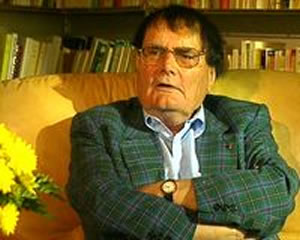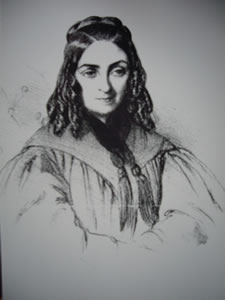De Engelse dichter William Wordsworth werd geboren op 7 april 1770 in Cumberland. Zie ook mijn blog van 7 april 2007 en ook mijn blog van 7 april 2008 en ook mijn blog van 7 april 2009.
A Night-Piece
——THE sky is overcast
With a continuous cloud of texture close,
Heavy and wan, all whitened by the Moon,
Which through that veil is indistinctly seen,
A dull, contracted circle, yielding light
So feebly spread, that not a shadow falls,
Chequering the ground–from rock, plant, tree, or tower.
At length a pleasant instantaneous gleam
Startles the pensive traveller while he treads
His lonesome path, with unobserving eye
Bent earthwards; he looks up–the clouds are split
Asunder,–and above his head he sees
The clear Moon, and the glory of the heavens.
There, in a black-blue vault she sails along,
Followed by multitudes of stars, that, small
And sharp, and bright, along the dark abyss
Drive as she drives: how fast they wheel away,
Yet vanish not!–the wind is in the tree,
But they are silent;–still they roll along
Immeasurably distant; and the vault,
Built round by those white clouds, enormous clouds,
Still deepens its unfathomable depth.
At length the Vision closes; and the mind,
Not undisturbed by the delight it feels,
Which slowly settles into peaceful calm,
Is left to muse upon the solemn scene.
“A SLUMBER DID MY SPIRIT SEAL”
A SLUMBER did my spirit seal;
I had no human fears:
She seemed a thing that could not feel
The touch of earthly years.
No motion has she now, no force;
She neither hears nor sees;
Rolled round in earth’s diurnal course,
With rocks, and stones, and trees.
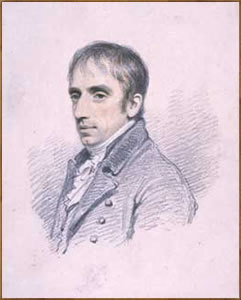
William Wordsworth (7 april 1770 – 23 april 1850)
Portret door Henry Edridge, 1806
De Argentijnse schrijjfster Victoria Ocampo werd geboren op 7 april 1890 in Buenos Aires. Zie ook mijn blog van 7 april 2009.
Uit: This America of Ours. The Letters of Gabriela Mistral and Victoria Ocampo (Introductie door Elizabeth Horan and Doris Meyer)
“Victoria Ocampo was the oldest of six girls born in the heart of Buenos Aires into a patrician family of successful businessmen and nation builders. She grew up trilingual as a consequence of her traditional home education provided by French and English governesses and lengthy stays in Europe with her family. She read voraciously in these languages, and her self-image was formed under their influence. By the time she was in her teens, however, Ocampo had already developed an aversion to the values of her social class vis-à-vis women’s status, and she determined to resist its dictates. Against the expectation of a traditional marriage and children, Victoria Ocampo quickly rejected the callow husband she had married in 1912 in a misguided effort to gain freedom from parental constraints. Thereafter she had a secret love affair for many years; since no public separation from her husband was possible without wounding her family, she never married again. Eventually, this relationship ended as well, and Ocampo then had a number of other affairs, often with men much younger than herself.”
In her elegant public profile, Ocampo reflected her class and era. She was strikingly beautiful well into middle age, which was noted even by her enemies, who use
d it to mock her. Photos of Ocampo in her twenties through her fifties show her dressed in couture clothes in the latest European fashions. A lover of avant-garde music and the arts, Ocampo chose a modernist design inspired by Le Corbusier for the first home she built for herself in 1927. The total effect of her bearing and appearance was the very opposite of Mistral’s impromptu style and disregard for formal attire. As often happens with women of power, Ocampo’s beauty, wealth, and cultural sophistication sparked resentment among those in Argentina who coveted her privilege while condemning the oligarchy. In fact, under the military dictatorship of Juan Domingo Perón, Ocampo was persona non grata in her own country, the complete antithesis of Evita, who dominated headlines with her defense of the descamisados.“

Victoria Ocampo (7 april 1890 – 27 januari 1979)
De Chileense dichteres en diplomate Gabriela Mistral werd geboren in Vicuña, Chili op 7 april 1889. Zie ook mijn blog van 7 april 2007 en ook mijn blog van 7 april 2008 en ook mijn blog van 7 april 2009.
The Sad Mother
Sleep, sleep, my beloved,
without worry, without fear,
although my soul does not sleep,
although I do not rest.
Sleep, sleep, and in the night
may your whispers be softer
than a leaf of grass,
or the silken fleece of lambs.
May my flesh slumber in you,
my worry, my trembling.
In you, may my eyes close
and my heart sleep.
To See Him Again
Never, never again?
Not on nights filled with quivering stars,
or during dawn’s maiden brightness
or afternoons of sacrifice?
Or at the edge of a pale path
that encircles the farmlands,
or upon the rim of a trembling fountain,
whitened by a shimmering moon?
Or beneath the forest’s
luxuriant, raveled tresses
where, calling his name,
I was overtaken by the night?
Not in the grotto that returns
the echo of my cry?
Oh no. To see him again —
it would not matter where —
in heaven’s deadwater
or inside the boiling vortex,
under serene moons or in bloodless fright!
To be with him…
every springtime and winter,
united in one anguished knot
around his bloody neck!
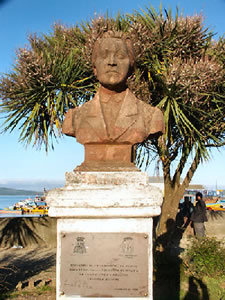
Gabriela Mistral (7 april 1889 – 10 januari 1957)
Monument in Ancud
De Amerikaanse schrijver Donald Barthelme werd geboren op 7 april 1931 in Philadelphia. Zie ook mijn blog van 7 april 2007 en ook mijn blog van 7 april 2008.en ook mijn blog van 7 april 2009.
Uit: The Dead Father’s Head
“The Dead Father’s head. The main thing is, his eyes are open. Staring up into the sky. The eyes a two-valued blue, the blues of the Gitanes cigarette pack. The head never moves. Decades of staring. The brow is noble, good Christ, what else? Broad and noble. And serene, of course, he’s dead, what else if not serene? From the tip of his finely shaped delicately nostriled nose to the ground, fall of five and one half meters, figure obtained by triangulation. The hair is gray but a young gray. Full, almost to the shoulder, it is possible to admire the hair for a long time, many do, on a Sunday or other holiday or in those sandwich hours neatly placed between fattish slices of work. Jawline compares favorably to a rock formation. Imposing, rugged, all that. The great jaw contains thirty-two teeth, twenty-eight of the whiteness of standard bathroom fixtures and four stained, the latter a consequence of addiction to tobacco, according to legend, this beige quartet to be found in the center of the lower jaw. He is not perfect, thank God for that. The full red lips drawn back in a slight rictus, slight but not unpleasant rictus, disclosing a bit of mackerel salad, lodged between two of the stained four. We think it’s mackerel salad. It appears to be mackerel salad. In the sagas, it is mackerel salad.”
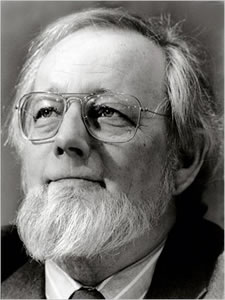
Donald Barthelme (7 april 1931 – 23 juli 1989)
De Oostenrijkse schrijver Johannes Mario Simmel werd op 7 april 1924 in Wenen geboren. Zie ook mijn blog van 7 april 2007, mijn blog van 5 januari 2009 en ook mijn blog van 7 april 2008 en ook mijn blog van 7 april 2009.
Uit: Hurra wir leben noch
“Der Hase musste sich an seinem Fahrrad festhalten und dreimal ansetzen, bevor er flüsterte: „Vierzigtausend?“
„Ja“, sagte Jakob mit einem freundlichen Blick seiner tiefdunklen Augen. „Und du radelst sofort weiter nach Theresienkron und alarmierst sämtliche Bauern. Sie sollen sich darauf vorbereiten, dass die vierzigtausend kommen – im Lauf der Nacht!“
„Aber das ist doch Diebstahl, Bärchen!“ sagte der Hase.
„Jetzt gilt Moral nur für die Sieger!“
„Da hast du natürlich auch wieder recht“, sagte der Hase.
Das Gespräch zwischen dem Bären und dem Hasen fand außerhalb des Fliegerhorsts statt, neben dem oben Strom geladenen Stacheldrahtzaun. Gleißendes Licht warfen Scheinwerfer über das ganze Gelände, über Tower, Hangars, Mannschaftsunterkünfte und draußen, weit entfernt, am Ende einer Landebahn, über die ‚Fliegende Festung’. Denn da in der Nähe, auf einem Flecken ausgedörrten Ackers, sollte nun auf Befehl des Cononel Hobson die gesamte Fracht der Eins-acht-eins mit Benzin übergossen und verbrannt werden.
Der Hase war schlank, hatte aufregende Kurven genau dort, wo sie hingehören, außerdem rehbraune Augen mit langen Wimpern und braunes Haar. Die Hase Hieß Julia Martens. Er trug ein Kornblumenblaues Kleid mit weißen Abnähern und weiße Schuhe. Der Hase hatte am 3. November 1946 nur ein einziges Kleid und ein einziges Paar Schuhe. Sonst besaß er noch selbst gefertigte, einigermaßen abenteuerlich aussehende Hosenanzüge. Und für seinen Bären hatte der Hase einen ebenso abente
uerlichen Anzug genäht. Derselbe war jedoch so beschaffen, dass Jakob – Multimillionär von 1965 – doch lieber in seinen eingefärbten Sachen herumlief. Im übrigen ist es jedermann bekannt, dass Verliebte sich zärtlich Tiernamen geben. Und Julia, genannt Hase, und Jakob, genannt Bär, liebten einander.
Jakob hatte aus Gründen, über die noch zu sprechen sein wird, seine Stellung als Dolmetscher bei der amerikanischen Militärpolizei in Wien Knall und Fall aufgegeben und mit Hilfe des Liebenswerten Generals Mark Clark in einer Verbindungsmaschine nach Linz fliegen müssen.”

Johannes Mario Simmel (7 april 1924 – 1 januari 2009)
Zie voor nog meer schrijvers van de 7e april ook mijn vorige blog van vandaag.



